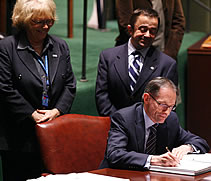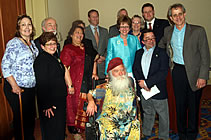Act Now

Empower U: Learn to Access Your Disability Rights Training on Canadian Human Rights, the Convention on the Rights of Persons with Disabilities (CRPD) and its Optional Protocol (OP) training aims to increase awareness of how to address discrimination using more familiar Canadian human rights laws such as Human Rights Codes and the newer international Convention on the Rights of Persons with Disabilities (CRPD). This is training for persons with disabilities by persons with disabilities. The training is part of a project funded by Employment and Social Development Canada and implemented by the Council of Canadians with Disabilities (CCD) in collaboration with Canadian Multicultural Disability Centre Inc. (CMDCI), Citizens With Disabilities – Ontario (CWDO), Manitoba League of Persons with Disabilities (MLPD) and National Educational Association of Disabled Students (NEADS). Read more.
Sign Up for our monthly digest
A monthly newsletter from CCD about what is happening in the community
War and Peace: Disability Issues
Related Documents
January 30, 2013
Official Development Assistance to the World Bank
June 4, 2010
Canadian Council for International Co-operation (CCIC) May Be Defunded
January 25, 2003
Peace Is A Disability Issue
For Immediate Release
10 August 2006
As world leaders work toward restoring peace in Lebanon, the Council of Canadians with Disabilities (CCD) reminds everyone that armed conflict always leaves a legacy of disablement. "We now have new brothers and sisters with disabilities who will have on-going needs related to their disabilities and the world community must not forget about these people," states Steve Estey, Chairperson of the CCD International Committee.
CCD urges world leaders to make a commitment to assisting those people who acquire disabilities during the current conflict. There are people on both sides of this conflict who are now facing life with disability. Like all people with disabilities, people disabled through warfare require disability-related supports. A disability-related support is any good or service that a person with a disability uses to live independently in the community. In addition, people disabled through armed conflict require access to medical and rehabilitation services. "As people with disabilities we empathize with the challenges that those with new disabilities caused by warfare are facing and we challenge the international community to assist the Middle East self-help organizations of people with disabilities respond to the support needs of those disabled in this conflict," states Marie White Chairperson of CCD.
"As people with disabilities are among the most marginalized in society, resources to meet our needs tend to be in short supply. In an area where there is armed conflict, there needs to be a redoubling of effort on disability issues. Governments, development agencies, and nongovernmental organizations need to increase their support to people with disabilities in the Middle East," states Estey. "People with disabilities in the Middle East are integral members of society and they and their organizations should be included in local, regional and international peace and reconstruction planning processes."
CCD works in solidarity with people from around the world through Disabled Peoples' International, a global disability rights organization. The affects of warfare have been a long-term concern for both organizations. In 1986, CCD adopted DPI's Peace Statement, which was crafted in Hiroshima, Japan. The Peace Statement, which was first released 24 June 1982 at the Peace Memorial Park, Hiroshima, Japan, declares:
Let all of us join together in a worldwide movement for peace. Let us call for all nations' economies to be transformed from war economies to peace economies. Let us insist that the $600 billion now spent on armaments is diverted to socially useful projects. Let us demand that the world leaders… begin the enormous task of redirecting our resources, our productions, our talents and our abilities from the creation of the weapons of war to the creation of the instruments of life.
For more information contact:
Marie White, CCD Chairperson 709-739-8233
Steve Estey, Chairperson CCD International Development Committee sbestey@eastlink.ca

Canada signs the Declaration on the Rights of Persons with Disabilities at the United Nations. Members of the Canadian Delegation Steve Estey, Chair of CCD’s International Committee, and Dulcie McCallum observe Canada’s ambassador make this historic commitment.

HRSDC Minister Diane Finley, Defense Minister Peter MacKay, NDP Disability Critic Judy Wasylycia-Leis, Liberal MP Mike Savage, Liberal MP the Hon. Carolyn Bennett and Bloc MP Yves Lessard joined leaders from the disability community at a CCD celebration of Canada's ratification of the CRPD.
